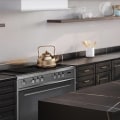Glass countertops can withstand high temperatures without cracking or burning, they don't stain and are non-porous, making them very hygienic. In the recent past, granite was generally only found in the most expensive homes, but today it is used more and is available in local home stores. Granite depends on heat for its formation and is very heat tolerant. One of the most heat-resistant countertop materials available today is granite.
This natural stone requires extremely high temperatures and pressures to form. You can place the pans directly from the stove or oven on a granite countertop and you won't see any marks or stains on the surface. It resists cracks and chips, and you can place a hot pot in it without catastrophes. If you apply sealant annually, granite resists staining.
Soapstone is another natural stone, usually dark gray in color with a soft and silky feel. It has experienced a recent resurgence as an alternative to granite. Soapstone is often seen in historic homes, but it is also used in modern homes as a countertop and sink material. Over time, soapstone acquires an antique-looking patina that can be very attractive in certain kitchen styles.
Contrary to expectations, the architectural soapstone used for countertops is actually quite hard and stain resistant. However, it will scratch over time, although this may increase the ancient patina of the stone. Although highly prized, marble may not be the best choice for kitchens due to its penchant for stains and scratches. Newer sealants can reduce the maintenance of marble, but this is a considerably more temperamental stone than granite or soapstone.
Tile countertops can look handcrafted or contemporary, making them a beautiful and versatile countertop material.
Kitchen countertops
are judged on several counts, including visual appeal, cost, stain resistance, effects, and scratches, and their ability to tolerate the heat of hot pots and pans without ruining the surface area. A kitchen is arguably the busiest room in the house, and its countertops are expected to carry a daily defense against hot pans, sharp knives, food spills, and more. The kitchen is a high-traffic area, and when it comes to selecting countertop materials, durability is paramount.In addition to looks and durability, one thing you should look for in kitchen countertops is heat resistance. Due to its extremely high price, marble is not often seen across the full extent of most kitchen countertops. After a thorough examination, we are ready to explain to you why you should or should not install one of these durable kitchen countertops. Laminated kitchen countertops are a paper and plastic product that covers several layers of Kraft paper with a resin impregnated with almost infinite colors and patterns.
If you have unusual shaped countertops, or if you want a truly unique kitchen, concrete can be a good choice for your countertops. We've put together a list of six countertop materials that will withstand the elements of your busy kitchen. It can also be a good material in high-end kitchens with a lot of countertop space that would be prohibitively expensive to cover with granite or quartz.






